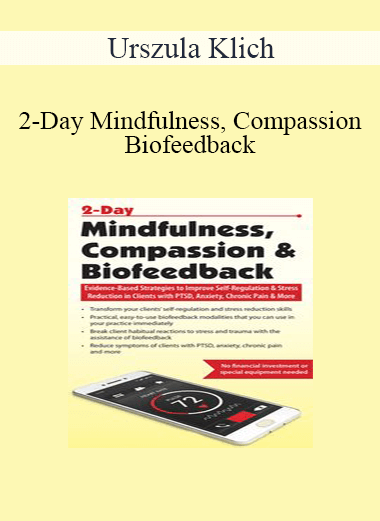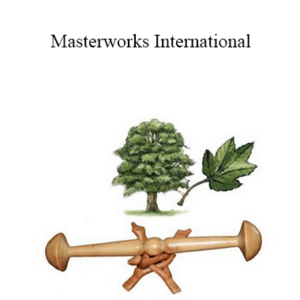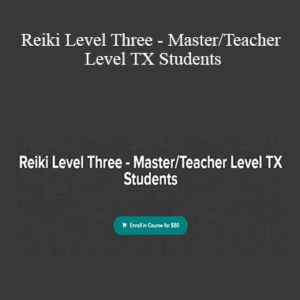- Faculty:
- Urszula Klich
- Duration:
- 2 Full Days
- Format:
- Audio and Video
- Copyright:
- Sep 24, 2019
Description
Outline
Integrate Biofeedback into Your Practice
- Biofeedback purpose and benefits
- Assess client reactivity
- Efficacy for various mental health conditions
- What happens when clients try to relax
- Stress & it’s relationship to pain
- How biofeedback works
- Choose the right tool for the job
- Usability and portability considerations
- Treatment goals
- Billing & documentation considerations
- Limitations of research & potential risks
- Practice Exercises: Using different biofeedback modalities
Respiration Biofeedback: Step-by-Step
- Meditation & the breath
- Assess dysfunctional breathing
- Symptoms of overbreathing
- Overbreathing & mental health
- Biofeedback modalities for breathing regulation
- Apps for use with respiration biofeedback
- Overcome barriers to improvement
- Practice Exercise: Respiration biofeedback
Thermal Biofeedback: Step-by-Step
- Symptoms of vasoconstriction
- Thermal biofeedback modalities
- Use thermal biofeedback to reduce level of arousal
- Teach clients to regulate temperature
- Integrate autogenic training & thermal biofeedback
- Practice Exercise: Hand temperature
Mindfulness & Compassion: Essential Skills for Use with Biofeedback
- Strategies to improve client engagement
- Promote psychological flexibility and adaptive functioning
- Autogenic training: Step-by-step
- Cognitively-Based compassion training
- Practice Exercise: Mindfulness & compassion
Mindfulness-Based Biofeedback Step-by-Step: Boost Clinical Effectiveness by Combining Mindfulness and Biofeedback
- Integrate physical, cognitive & emotional well-being
- When to use mindfulness-based biofeedback
- Assess client nervous system reactivity
- Biofeedback-driven goals
- ”Activate” the parasympathetic nervous system
- Help clients explore their values
- Take a strengths inventory
- Complementary relaxation techniques
- Utilize the MBB Cognitive Awareness Log
- Biofeedback-assisted body scan
- Barriers to mindfulness-based biofeedback
- Practice Exercises: Mindfulness-based biofeedback techniques
Mindfulness-Based Biofeedback for Skills Development
- Choose the best combination of mindfulness practices & biofeedback modalities
- What to monitor & when
- Take-home worksheet resources
- Help clients transition behaviors into habits
- Relapse or normal fluctuations in learning?
- Client homework: Simple starting points
- Practice Exercises: Use biofeedback for skills development
- Attention & prevention
- Distraction
- Thought management
- Awareness
- Problem reconceptualization
- Tension reduction
- Self-regulation
Mindfulness-Based Biofeedback in Action: Confidently Tailor for Use with Specific Disorders & Special Clinical Populations
- PTSD
- Anxiety and panic
- Depression
- Chronic & acute pain
- Headaches
- Military
- Couples
- Children
Faculty
Urszula Klich, Ph.D., BCB Related seminars and products: 1
My Mindful Way
Dr. Urszula Klich, Ph.D, BCB, is a clinical psychologist, speaker, and author who teaches self-regulation to maximize physical and emotional health. She is a certified meditation teacher in Cognitively-Based Compassion Training (CBCT) through Emory University and has served on various medical teams.
She is board certified in biofeedback and is the president of the Southeast Biofeedback and Clinical Neuroscience Association. Her specialized program of Mindfulness-Based Biofeedback (MBB) has been published and widely applied from hospitals to classrooms based on the premise that integrating mindfulness and compassion-informed treatment with psychology fosters individuals’ healing power to improve physical, emotional, and spiritual well-being.
Living mindfully is advantageous and accessible to anyone who recognizes a need for a shift in their lives and sets an intention to move forward. She is a sought-after workshop leader and internationally recognized speaker in health and wellness.
Speaker Disclosure:
Financial: Urszula Klich maintains a private practice. She receives a speaking honorarium from PESI, Inc.
Non-financial: Urszula Klich is president of the Southeast Biofeedback and Clinical Neuroscience Association.
Delivery Method
– After your purchase, you’ll see a View your orders link which goes to the Downloads page. Here, you can download all the files associated with your order.
– Downloads are available once your payment is confirmed, we’ll also send you a download notification email separate from any transaction notification emails you receive from coursesblock.com
– Since it is a digital copy, our suggestion is to download and save it to your hard drive. In case the link is broken for any reason, please contact us and we will resend the new download link.
– If you cannot find the download link, please don’t worry about that. We will update and notify you as soon as possible at 8:00 AM – 8:00 PM (UTC 8).
Thank You For Shopping With Us!







